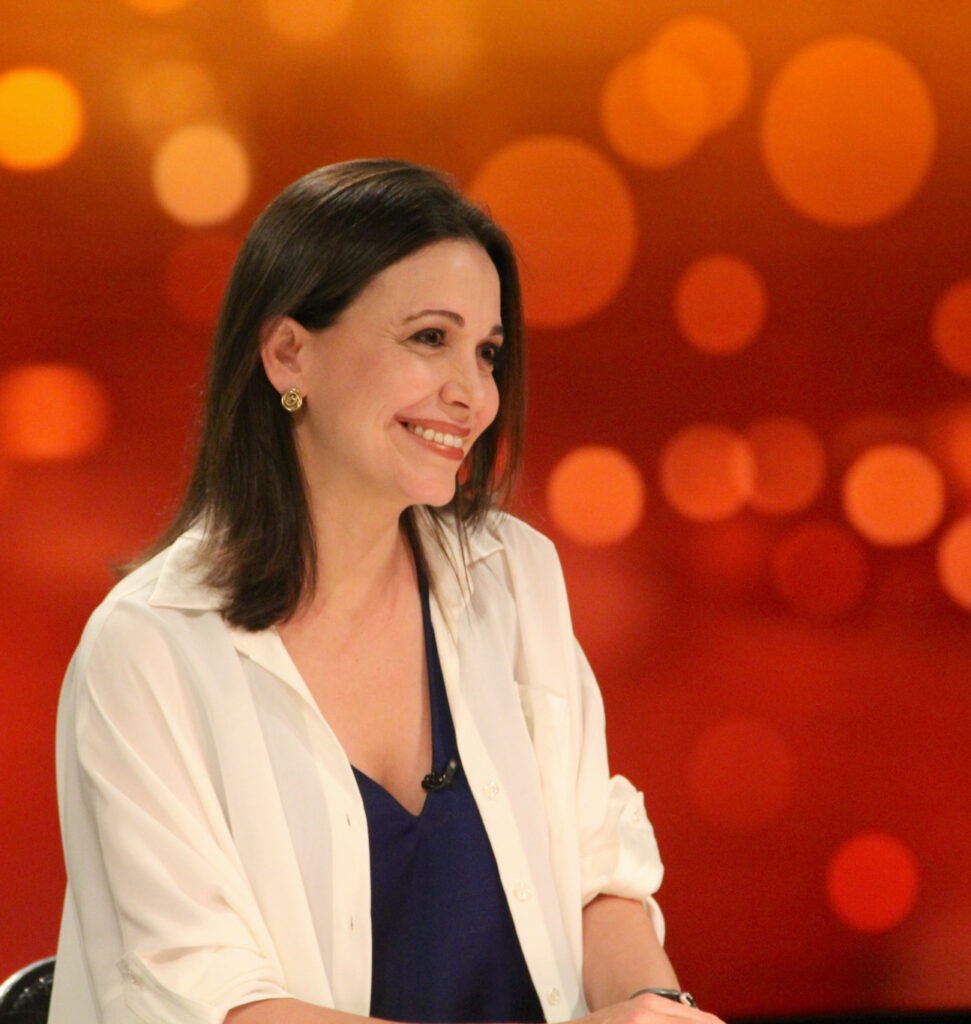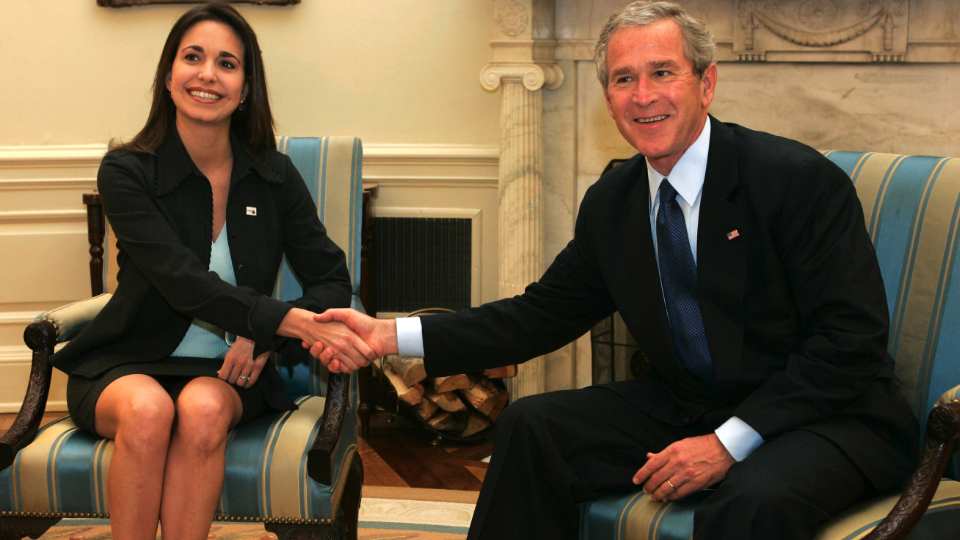Along with her ability to mobilise the opposition, for more than twenty years Machado has contributed to the deep polarisation and lack of trust that has defined relations between the government and the opposition.
Begum Zorlu

María Corina Machado, Venezuela’s best-known opposition figure, has been awarded the 2025 Nobel Peace Prize for what the committee described as her “unwavering commitment to democratic change and civil resistance in the face of authoritarian repression.” The decision has sparked celebration among her supporters and disappointment among critics, reviving debate over her confrontational style, ideological rigidity, and the divisions she has generated within Venezuela’s opposition movement.
Machado was born in Caracas in 1967, into an influential industrial family. She earned an industrial engineering degree from the Universidad Católica Andrés Bello before studying at Yale University. Her father, Henrique Machado Zuloaga, was a prominent businessman, and her mother, Corina Parisca, a philanthropist. In the early 2000s she co-founded Súmate, a civil society organisation that monitored elections and promoted civic participation during Hugo Chávez’s presidency. While the group’s campaigns against electoral fraud drew international recognition, including support from the US, they also marked Machado as an explicitly anti-Chavista figure from the outset, situating her in sustained opposition to the Bolivarian project.
A Mobiliser, Yet a Polariser
Along with her ability to mobilise the opposition for more than twenty years, Machado has contributed to the deep polarisation and lack of trust that have defined relations between the government and the opposition.
One of the critical events that entrenched the polarisation between Chavismo and the opposition was the military coup of 2002. During the brief April coup that ousted Hugo Chávez for two days and installed business leader Pedro Carmona as interim president, Machado signed the Carmona Decree, the document that dissolved the National Assembly and Supreme Court. Although she was not among the coup’s organisers, her signature was widely seen as an endorsement of the coup. Machado later defended her action as support for a “constitutional transition,” but the episode left a lasting mark. The Organization of American States and much of the international community, including the US after initial hesitation, condemned the coup and called for the restoration of constitutional order.
Machado also gained global attention in 2005 when she was received in the Oval Office by then-President George W. Bush, a meeting that symbolised Washington’s early endorsement of Venezuelan opposition figures. Two decades later, she would again align closely with a Republican administration, praising former US President Donald Trump for his “visionary” support of Venezuela’s democratic cause. Following the Nobel announcement, Trump publicly confirmed that Machado had personally called to thank him for his backing.

At home, Machado remains a deeply polarising figure. Her supporters cast her as a symbol of opposition resistance and a fearless voice against repression. It is true that she is the country’s most popular opposition leader and has continued to operate inside Venezuela despite intensifying persecution, even as many of her allies have been forced into exile. Yet she is also criticised for undermining opposition unity through an inflexible leadership style and ideological purism, characteristics she has at times openly defended.
One source of Machado’s polarising role has been her long-term support for sanctions and interventions. In testimony before the US Congress in 2022 (and consistently throughout her career), Machado urged Washington to tighten sanctions, arguing that external pressure was essential to force democratic change. This agenda has long divided the opposition, with some leaders favouring engagement and negotiation over confrontation and isolation. Yet she has framed those questioning her position as “traitors,” further marginalising different voices within the opposition.
Recent events also show a similar picture. Tensions between Venezuela and the United States soared following a US military strike on a Venezuelan speedboat in September, which the US administration claimed was carrying drug traffickers. Machado, defended the attack, telling The Sunday Times that Trump was right to bomb the vessel. “I totally support his strategy,” she said. “And I’ve said on behalf of the Venezuelan people that we are very grateful. I think it is the right thing to do. It’s courageous. It’s visionary.”
Leading Opposition Failure
Furthermore, the success of her political strategy is highly questionable. Abstentionism has long been a defining feature of Machado’s political strategy. As director and co-founder of Súmate, she played a central role in the 2005 parliamentary election boycott, which the opposition justified as a protest against unfair electoral conditions under Hugo Chávez. The move was intended to delegitimise the process but instead proved deeply consequential: by vacating the National Assembly, the opposition ceded institutional control and enabled Chavismo to consolidate full power, paving the way for sweeping constitutional changes that entrenched its rule. This early embrace of abstentionism foreshadowed Machado’s later strategy of rejecting participation in elections, a stance that, while rooted in principle, has repeatedly marginalised the opposition and limited its political leverage.
There is no doubt that the opposition operates under an extremely repressive environment that has intensified year by year. However, in the last electoral cycle, Machado’s camp again framed abstention as a form of protest, though her continued hiding and González’s exile raised doubts about their capacity to achieve meaningful change. This produced a paradoxical outcome for the opposition. By exploiting divisions within opposition ranks, Maduro appeared to deliberately deepen internal rifts to weaken any coordinated challenge to his rule. Sustaining opposition fragmentation thus seems not merely opportunistic, but a calculated pillar of the regime’s strategy. At the same time, Machado’s camp showed little interest in preserving opposition unity, seeking instead to dominate and define it on her own terms.
The Risk of Reinforcing an Anti-Democratic Actor
Overall, for supporters, the Nobel Prize recognises Machado’s courage, perseverance, and personal sacrifice in confronting one of the most entrenched authoritarian regimes in the Western Hemisphere. For critics, however, the decision risks legitimising a polarising and increasingly illiberal figure whose confrontational and exclusionary style has often hindered collective action and deepened opposition fragmentation. Her open admiration for Donald Trump, whom she has called “visionary” and “courageous,” further complicates her democratic credentials, aligning her with a strain of populist authoritarianism that challenges liberal norms abroad.

